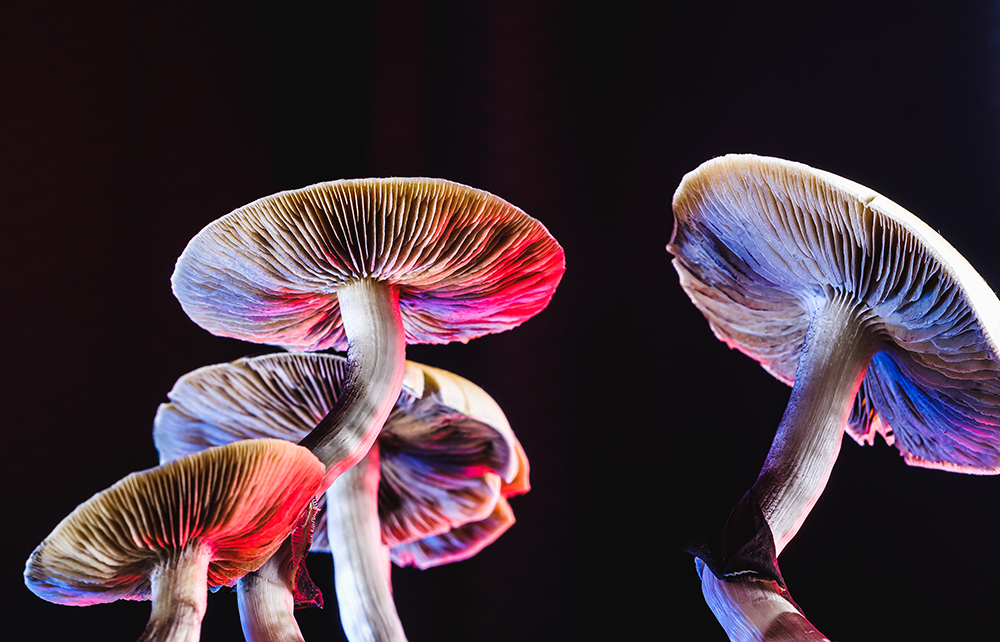We are in the midst of a ‘psychedelic renaissance’. Not since the 1950s and early 1960s has there been so much interest in researching the therapeutic potential of psychedelics. The FDA approved a ketamine derivative for medicinal use in 2019, and has given both MDMA and psilocybin (the psycho-active ingredient in magic mushrooms) ‘breakthrough therapy’ status, putting the drugs on a fast track to approval in the US, with the UK likely to follow suit.
Professor David Nutt is a neuropsycho-pharmacologist (say that three times fast) and head of the Centre for Psychedelic Research at Imperial College, London. He was the UK’s ‘drug tsar’ before getting sacked in 2009 for claiming that LSD and Ecstasy are less dangerous than cigarettes, alcohol or horseback riding. (His views have been more welcome in Australia, where the traditionally conservative regulator legalised psychedelic therapy this year, after lobbying by Nutt.)
In Psychedelics, his sixth book, Nutt is unabashedly gung-ho about the benefits: psilocybin ‘will be the biggest innovation in psychiatry treatment for 50 years’, he writes. The book rates the potential of various compounds to treat conditions including PTSD, depression, anxiety, addiction, OCD and end-of-life distress. With one in four adults meeting the criteria for a mental health diagnosis at some time in their lives, and with up to 40 per cent of patients not responding to standard antidepressants, the market potential is massive: psilocybin has a 2028 projected market value of $6.4 billion in the US alone.
The counter-cultural mantra of the 1960s was Timothy Leary’s ‘turn on, tune in and drop out’. But fMRI scanning in Nutt’s lab has shown that rather than tuning in, psychedelics allow the mind to tune out. They appear to shut down the default mode network which coordinates various functions in the brain. When the DMN goes offline, a patient is able to step out of recurring thought patterns, including ideas and beliefs about the world and their sense of self, enabling the brain to form new connections.
Written in co-operation with Nutt’s regular ghost writer, the journalist Brigid Moss, the prose in Psychedelics plods along like a middle-school book report. Homework with occasional commercial breaks, that is, as Nutt pauses to flag his affiliations with companies poised to profit from the psychedelic boom. Still, one can learn things from book reports. Despite all the hype around micro-dosing, for example, Nutt’s research has found that it works, but no more than a placebo.
In Ten Trips, the neuropsychologist Andy Mitchell takes a more sceptical stance. Although not immune to raving about some of his psychedelic experiences, given the financial rewards at stake, who is funding psychedelic research, he asks. ‘Investors prefer to back therapeutic-based research where there are opportunities for patenting and therefore profitability rather than more investigative neuroscience,’ he notes.
While scrupulous scientists flag when findings are ‘qualified or partial or preliminary’, others brush over that they are based on small samples or have yet to be replicated. Tribalism prevents researchers from speaking out about negative experiences because ‘if you’re not on message, you’re the enemy’. Mitchell also points out the ethical issues around the exploitation of indigenous tribes who cultivate plant medicines, and conservational concerns about the species of toad whose venom boasts psychoactive properties.
Troubled that the subjective element of the psychedelic experience is lost in the clinical data, Mitchell endeavours to round out the picture. As a long-standing member of Alcoholics Anonymous, he was wary of psychedelics, but was reassured that they were not addictive. He documents ten experiences he had over a busy two months, from taking lab-synthesised substances such as LSD, MDMA and 5-MeO-DMT to plant medicines including ayahuasca and San Pedro – in locations ranging from the barrel of an MRI machine in London to the Colombian Amazon. His narrative voice is philosophical and darkly humorous, although the riffs can get, well, trippy. (It’s no surprise to learn that parts of the book were written while he was micro-dosing.)
Paradoxically, the sanitisation of psychedelics for medicinal purposes outside of shamanic ceremonial settings may strip them of some of their healing power. ‘Amid growing hype that psychedelics are a panacea for mental illness,’ one of Mitchell’s interlocutors worries about ‘a medicalisation effort [she] increasingly doubt[s] can fully attend to the weird wildness of these medicines’. Hallucinogens can take psychonauts to heaven or hell, but for all the mystical experiences they afford, divesting them of their shadow side does seekers a disservice, Mitchell holds.
For all their therapeutic benefits, one wonders if the renewed interest in such immersive experiences is not partly due to a greater crisis of meaning in a culture that, as Mitchell writes, ‘demands the narcotic of novelty more than anything else’. In 1994, Terence McKenna, Leary’s spiritual son, predicted that ‘what we will see in the future is computers much more like drugs, and drugs much more like computers’. Alongside increased scientific and financial interest in psychedelics, the renaissance must include the humanities to shade in meaning, Mitchell argues.
In his evangelism, Nutt de-emphasises the risks of psychedelics. Mitchell is more circumspect, citing studies in which some participants experienced adverse effects. Michael Pollan, the author of the 2018 How to Change Your Mind, which extols the benefits of psychedelics, also advocates caution. Pushing for full legalisation before adequate research is accomplished risks provoking a 1960s-style backlash, he warns. Given the potential benefits of psychedelics to our ailing minds and spirits, it would be a shame to see the research set back for another 50 years.






Comments